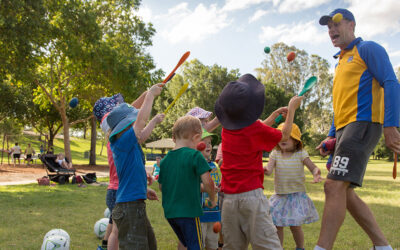Tucked within the vibrant Gold Coast Health and Knowledge Precinct, a quiet revolution is underway. At Sanctuary Early Learning Adventure’s newest centre, Sanctuary Health and Knowledge Precinct (Sanctuary HKP), inclusion isn’t just a checkbox — it’s the foundation.
Here, children of all abilities are welcomed with open arms, families feel heard and supported, and educators are trained not only to teach but to listen, adapt and grow. Leading this charge is Melissa Taylor Hansford, Sanctuary’s Diversity and Inclusion leader, whose calm confidence and clear vision are helping shape a new kind of early learning experience — one where everyone truly belongs.
But this journey is not hers alone.
Centre Director Jemma Grace says, “To me, inclusive practice means valuing and respecting every individual’s unique background, needs and abilities. At Sanctuary HKP, we embed this by creating a welcoming environment, celebrating diversity, and adapting our programs and communication so all children and families feel seen, heard and supported.”
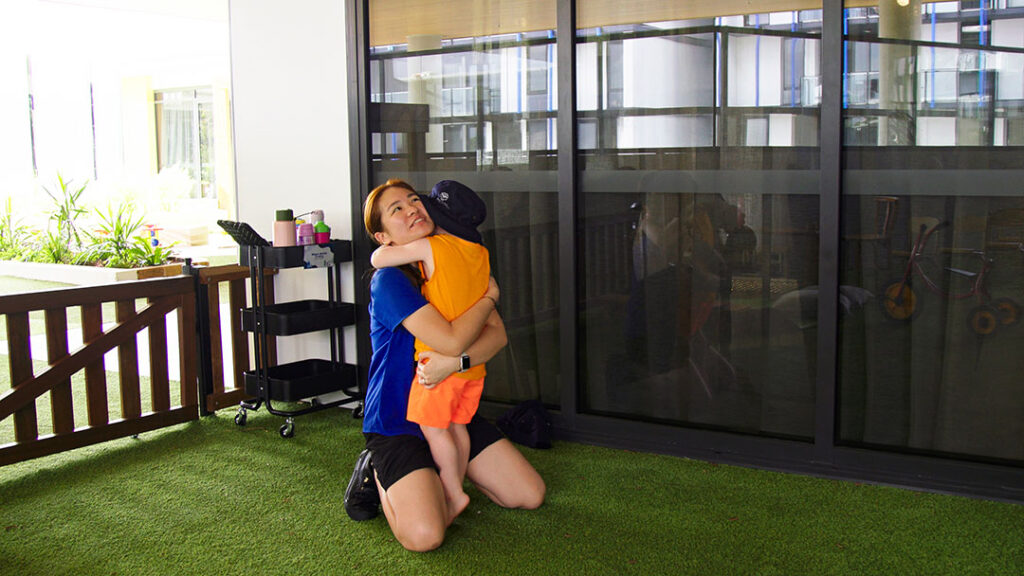
Educator giving student a hug at Sanctuary Early Learning Adventure, Gold Coast
Inclusion in early learning starts with intention
The design of Sanctuary HKP — both in the physical environments and in its approach — was guided by a deep desire to create something genuinely different by the Approved Providers Lauren and Damian Hall.
“It wasn’t just about accessibility,” Melissa explains. “It was about building a place where inclusive practice wasn’t an afterthought, it was the foundation.”
That meant reimagining enrolment transitions, creating spaces with sensory needs in mind, hiring values-based educators, and offering tailored support for every child and family who walked through the doors, should they require it.
At the core of this ethos is the belief that every child brings something valuable to the community regardless of ability or background. “We embrace their strengths, their personalities, how they contribute to the centre, and then look at adjustments to then support that,” Melissa says. “That includes educators and families, too.
Training that makes inclusion real
This culture of inclusion is backed by comprehensive professional development. The foundation team undertook an extensive two-week induction to lay the groundwork for inclusive, trauma-informed practice. Today, new team members participate in a structured two-day induction before stepping onto the floor. Day one focuses on essential operational information — processes, policies, compliance, and centre expectations. Day two is dedicated to immersive learning with Melissa and the Centre’s Educational Leader, BB Hunnybunn, where new educators absorb a condensed version of the original two-week program. This includes key topics such as trauma-informed practice, antibias approaches, visual communication and universal supports, and culturally responsive practice with a strong emphasis on Indigenous perspectives.
Melissa meets with every new team member during this time, which is a chance to share Sanctuary’s vision and begin a relationship based on mentorship and trust.
It doesn’t stop there. The team continues learning with Abecedarian training, guidance from early childhood expert Kelly Goodsir, and ongoing professional development tailored to team interests and centre needs.
Jemma has seen the results firsthand: “Our team are more skilled in creating inclusive environments and are more open to reflecting on their practices. We’ve built a culture where learning is constant and deeply valued.”
The key, she believes, lies in hiring for mindset, not just skillset. “We hire our team based on their values and interest in growth. That’s strengthened our culture and transformed the way we support children and families.”
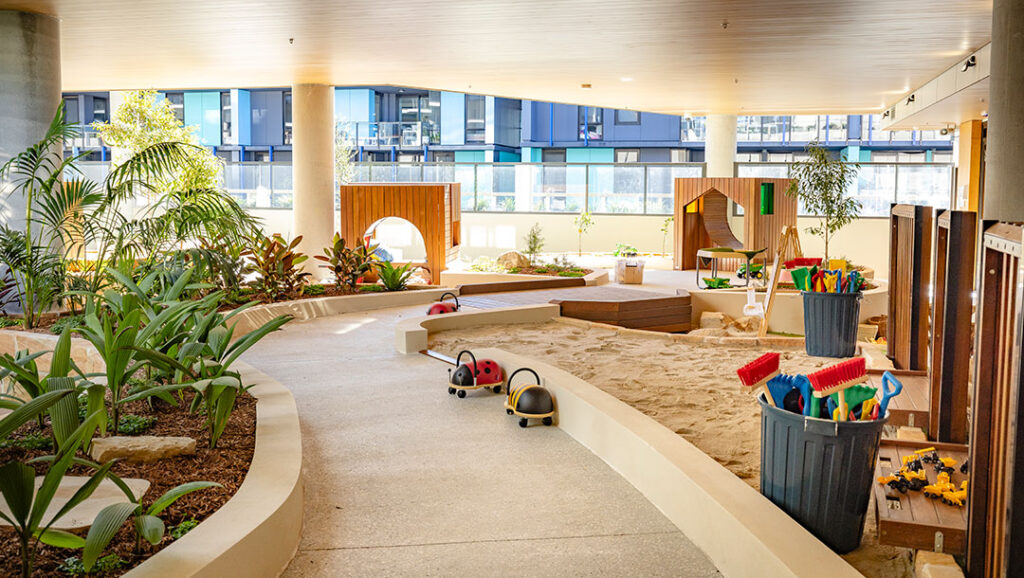
The outdoor space at Sanctuary HKP
The Family Model of Support: A Community Mindset That’s Growing
One of the most innovative practices at Sanctuary HKP is their Family Model of Support — a living, breathing framework that wraps around families when they need it most.
“It started as a way to support families navigating disability diagnoses,” Melissa shares. “But it’s broader than that. Now, we support families navigating a variety of areas, including mental health, changes in family dynamics, child behaviour support or social disconnection.”
Some families engage deeply with the model, relying on referrals, documentation support, or weekly check-ins. Others might just need an occasional conversation and reassurance. “It’s not one-size-fits-all,” Melissa says. “It’s about meeting families where they are.”
The approach is warm, non-judgmental, and profoundly relational. “If I write a support letter, nothing gets sent without the family seeing it first. It’s collaborative — we work alongside families to get things done.”
That trust has led to beautiful, unexpected moments. One family, without hot water following Cyclone Alfred, came to the centre to shower. “That level of trust — that comfort in our place — is a privilege,” Melissa says.
And it’s not just HKP families benefiting from the model anymore.
Due to its early success and overwhelmingly positive feedback, the Family Model of Support has been extended across all six Sanctuary centres. Each centre tailors the model to suit its unique community while staying true to its core: responsive, compassionate, individualised support for families navigating complex needs.
This evolution has been further strengthened by Melissa’s role in delivering specialised training across the entire Sanctuary network. Her workshops, coaching sessions and mentoring have equipped teams with the understanding, sensitivity and tools to bring the Family Model of Support to life — no matter where they’re located.
The result? A consistent and deeply human approach to family support that is transforming not only the way Sanctuary educators work, but also how families experience early learning.
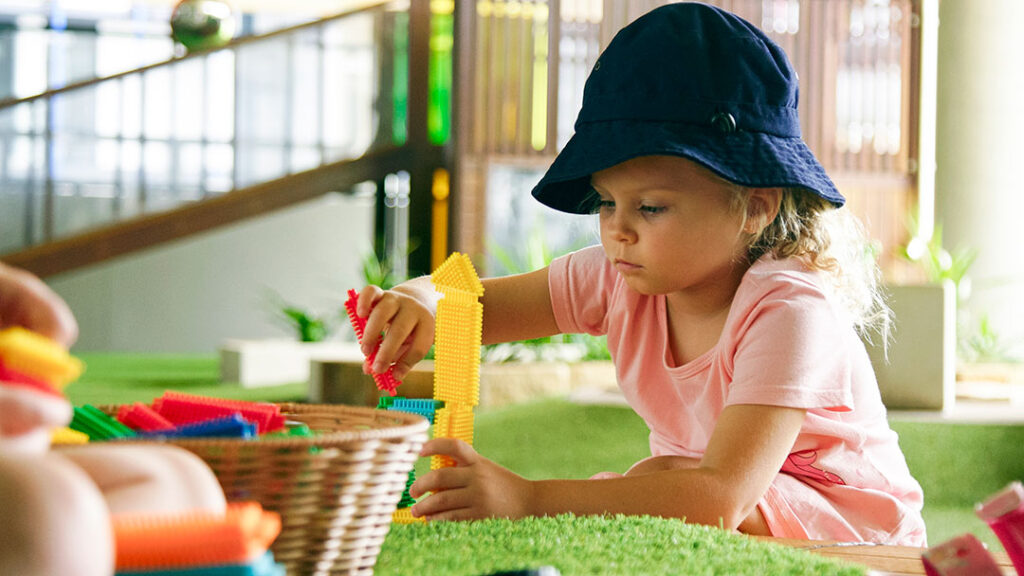
Child-led play at Sanctuary HKP
Inclusion starts at the very beginning
The centre is also redefining what it means to work as a team around a child. “We’ve had physiotherapists review our rooms and support before children enrol. Key workers join orientation visits. Occupational and Speech Therapists collaborate with our educators. It’s not about hierarchy — it’s about shared understanding,” Melissa explains.
Everyone’s input — from educators to allied health professionals to families — is valued equally, ensuring a unified approach that supports each child holistically. “We all bring different lenses of the child, and when we put those together, we create one clear pathway to success, whatever that looks like, for the child.”
A vision realised through partnership
Sanctuary HKP is not working alone. Through a rich partnership with Griffith University, the centre is actively engaging in research that pushes the boundaries of inclusive early childhood education.
“The university has been open, respectful and collaborative,” Melissa shares. “We’re for-profit with a social conscience — and this partnership allows us to give back to the sector in meaningful ways.”
The collaboration has already borne fruit, with the development of research expressions of interest, the creation of a structure for a playbook, and shared professional learning opportunities.
The idea behind this research collaboration is to share the findings throughout the sector to help create meaningful change and focus on inclusive practice.
Shifting mindsets, growing confidence
All this learning and collaboration is building more than knowledge — it’s building courage.
“There’s a wider threshold for inclusion here,” Melissa says. “Educators feel empowered. They’re not afraid to ask for help. They know they’re supported.”
And that confidence has a ripple effect — extending to children, families, and beyond.
Jemma agrees: “Watching the team grow in confidence, compassion, and inclusivity has been a privilege. It’s inspiring to see our shared values come to life.”
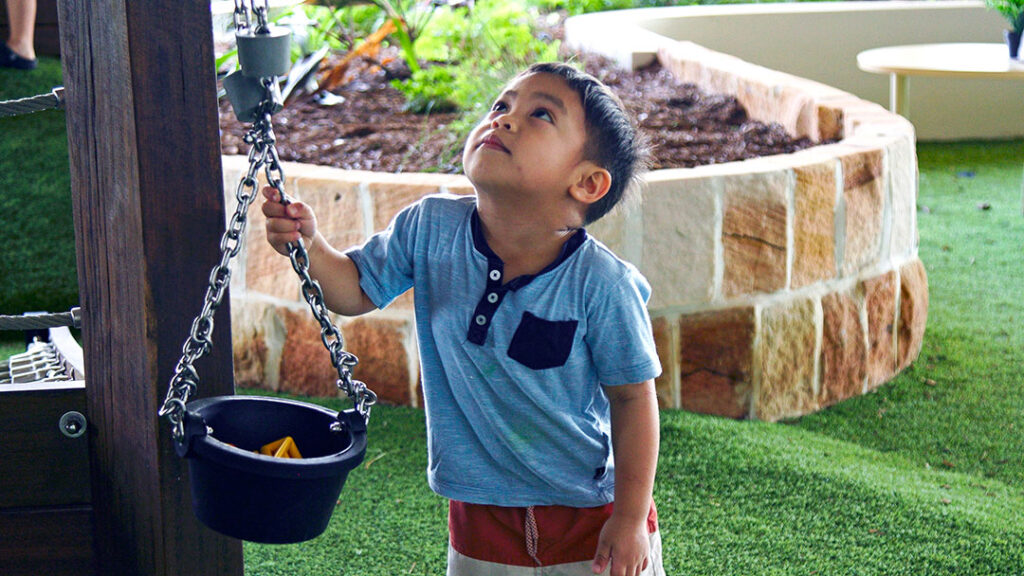
Playing outdoors at Sanctuary Early Learning Adventure Gold Coast
A place of purpose and belonging
The culture at Sanctuary HKP is as fulfilling for educators as it is for families.
“One of our team members said this is the most fulfilled she’s ever felt in her career,” Melissa shares. “That’s powerful. That says something about the way we’re working and who we’re working with.”
And for Jemma, leading this team has been one of the most rewarding parts of her career. “We make a meaningful impact every day. I feel incredibly fortunate to be surrounded by people so committed to creating a welcoming, supportive environment.”
What lasts beyond the walls
When asked what she hopes the legacy of Sanctuary HKP’s inclusive approach will be, Jemma’s answer is simple and powerful: “A stronger sense of belonging, acceptance and empowerment — for everyone.”
For Melissa, it’s about creating life-changing experiences. “When poor inclusive practice is in place, it can be detrimental to a child’s development. But when it’s done right? It’s transformative — for the child, the family, the educator. Everyone grows.”
Her advice for other services wanting to start their own inclusion journey?
“Slow down to get better. Don’t rush to enrol without preparing. Take the time to learn about the child, build the environment, and train your team. When you do that, success follows — for everyone.”
At Sanctuary HKP, inclusion isn’t a goal. It’s a practice. It’s a value. And most importantly, it’s a promise — that every child will be seen, celebrated, and supported to thrive.
If you want to know more about Sanctuary Early Learning Adventure, call 1300 00 PLAY today or visit their website.
Spanning Brisbane, Gold Coast, Sunshine Coast and beyond, Kids on the Coast is an online guide and printed free magazine for parents. With kids events and activities, attractions & things to do with kids, schools and education, school holiday guides, health & wellbeing for families, parenting and lifestyle news. Located on the Gold Coast, Sunshine Coast & Brisbane, QLD.
